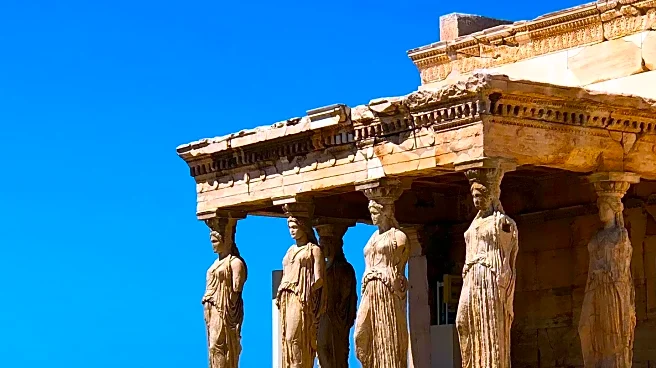What is the story about?
What's Happening?
A German woman has returned an ancient relic she stole over 50 years ago from Olympia, Greece. The limestone capital of a column, taken from the Leonidaion, a 4th-century BC guesthouse, was returned to Greece with the assistance of the University of Muenster. The Greek culture ministry praised the woman's decision, highlighting her sensitivity and courage. This return is part of a broader effort by the University of Muenster to repatriate antiquities, having previously returned other artifacts, including a twin-handled wine cup and a Roman-era marble head. The act underscores the importance of cooperation and mutual respect in cultural heritage preservation.
Why It's Important?
The return of the ancient relic is significant as it reflects ongoing efforts to repatriate cultural artifacts to their countries of origin. Such actions contribute to the preservation of cultural heritage and foster international cooperation. The gesture by the German woman and the University of Muenster sets a precedent for other institutions and individuals holding artifacts to consider returning them. This aligns with Greece's long-standing goal of repatriating antiquities, including the Parthenon Marbles, which have been a subject of international debate. The return of artifacts not only restores historical integrity but also strengthens diplomatic relations between countries.
What's Next?
Greece will likely continue its efforts to repatriate other significant artifacts, including the Parthenon Marbles from the British Museum. The successful return of the column capital may encourage other institutions and individuals to follow suit, potentially leading to more artifacts being returned to their rightful places. The Greek culture ministry may engage in further negotiations and collaborations with international museums and universities to facilitate these returns. Additionally, this event may inspire discussions on the ethical responsibilities of artifact holders and the importance of preserving cultural heritage.
Beyond the Headlines
The return of the relic highlights the ethical considerations surrounding the ownership and display of cultural artifacts. It raises questions about the responsibilities of museums and private collectors in preserving and respecting cultural heritage. The act of returning stolen artifacts can serve as a form of reconciliation, acknowledging past wrongs and fostering a sense of global cultural stewardship. This development may also influence public opinion and policy regarding the repatriation of cultural property, encouraging more transparent and cooperative approaches to cultural heritage management.
















